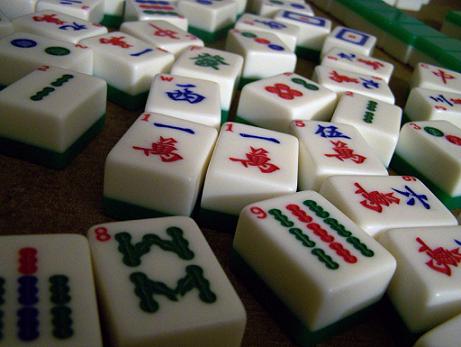Are Board Games Dangerous?
06 Feb
Posted by David Miller as Card Games, Classic Board Games, Modern Board Games
 As I reported before, board and card games have been known to cause seizures. But are board games also a factor in physical injuries?
As I reported before, board and card games have been known to cause seizures. But are board games also a factor in physical injuries?
According to the U.S. Consumer Product Safety Commission, the answer is yes. Based on reports to the National Electronic Injury Surveillance System (NEISS), there were an estimated 28,000 game-related hospital emergency room visits between 2012-2016. Another 38,000 visits were specifically associated with marbles.
About half the patients were children under 10 years of age. And in approximately 10 percent of cases, the patients were admitted following initial treatment.
The most common types of injuries involved:
- Infants and toddlers swallowing game pieces.
- Stepping or slipping on game pieces left on the floor.
- Dealing playing cards or rolling dice that end up hitting people in the eye.
- Wrist sprains from slapping cards down on the table.
- Games that fall off the shelf and hit people in the head.
- Dizziness and back pain from sitting too long.
- Numbness, bursitis, or pain in the arms, neck, and shoulders from long hours of playing and dealing cards.
- Falling off one’s chair.
However, some of the more unusual reports include:
- “11 year old female slipped on a playing card and slid down 20 stairs on butt”
- “2 year old female with a plastic bone in nose from the game Operation”
- “3 year old female was choking; swallowed one of the little plastic balls that the Hippos eat”
- “8 year old male fell onto Jenga game blocks and hit his mouth; there was damage to hardwood floor”
- “16 year old female; patient was home playing <REDACTED>; hit nose onto boyfriend’s knee; diagnosis nasal trauma with [nose bleed]”
- “Foreign body pubic region; 36 year old male embedded domino in penis ‘to please the ladies'”
- “45 year old white female at home having rough sex and playing naked <REDACTED>; partner’s knee hit patient’s elbow; diagnosis elbow dislocation”
- “42 year old male, 1 year ago carved down piece of domino, incised penis, inserted domino piece into penis; now wants it removed”
- “42 year old male hit in head with Jenga block playing and now has closed head injury”
- “19 year old male complaining of shoulder pain after doing extreme motions playing Charades at home tonight; diagnosis dislocation right shoulder”
- “51 year old male with abrasions to scrotum; notes was sitting down playing cards for hours”
- “32 year old male playing a game and jumped up hitting light fixture to head; diagnosis lacerated scalp”
- “13 year old female was dancing on a table when she slipped on a board game and fell and injured her right foot”
- Comments Off on Are Board Games Dangerous?
Board Game Epilepsy
29 Sep
Posted by David Miller as Card Games, Classic Board Games, Modern Board Games
 Imagine that your favorite board game made you sick. I mean, convulsing on the floor, eyes rolling back, foaming at the mouth sick! That’s what recently happened to a 52 year old Chinese man while playing Mahjong. Still, who would have imagined a tabletop game causing seizures. But after a second incident mid-game, doctors with the Zhejiang University School of Medicine diagnosed Mahjong epilepsy.
Imagine that your favorite board game made you sick. I mean, convulsing on the floor, eyes rolling back, foaming at the mouth sick! That’s what recently happened to a 52 year old Chinese man while playing Mahjong. Still, who would have imagined a tabletop game causing seizures. But after a second incident mid-game, doctors with the Zhejiang University School of Medicine diagnosed Mahjong epilepsy.
Mahjong epilepsy is a rare reflex epilepsy syndrome, a type of condition in which seizures can be brought on by certain stimuli, such as flashing lights. Mahjong epilepsy most closely resembles a cognition epilepsy subtype, in which seizures are induced by decision-making, spacial tasks, and other thought processes. There have been cases of seizures induced by writing, drawing, and performing mathematical calculations.
In a 2007 study of 23 cases, doctors in Hong Kong, however, found Mahjong epilepsy sufficiently distinctive, noted that both playing and just watching Mahjong could lead to seizures, and ruled out stress or sleep deprivation as the cause. In the recent Chinese case, the man’s doctor hypothesized that a possible trigger could have been the patterns of circles and dots found on Mahjong tiles.
Other cases of game-induced seizures have been confirmed by medical professionals. A 1965 article in the Chinese Medical Journal documented four patients with repeated epileptic seizures playing and watching games of Chess and cards. Among these cases, the sufferers would find themselves uncontrollably gesturing with their arms, standing and spinning, and losing consciousness.
Case studies in the journal Epilepsia report on an Italian man who over a period of years suffered “arrests of thought” when playing cards or Draughts, three Asian patients for whom cards and Draughts induced tonic-clonic seizures, and an American woman who experienced generalized seizures when playing Checkers.
See also the Journal of Neurology, Neurosurgery, and Psychiatry for a report on a patient who’s jerking motions and loss of consciousness were evoked by attempts to solve a Rubik’s Cube; Neurology for a study of 25 cases involving “activation of seizures by calculation, card, and board games“; and the Journal of Clinical Neurology (Korea) for information on 13 patients who experienced seizures while playing the card game Go-Stop and four patients who’s seizures were triggered by playing Baduk (Go).
- Comments Off on Board Game Epilepsy
Research Associates Playing Games With Mental Health in Seniors
05 Feb
Posted by David Miller as Card Games, Classic Board Games, Modern Board Games, War Games
 According to a study by researchers with the Mayo Clinic, seniors who play games are less likely to experience mild cognitive impairment (MCI), an intermediate stage of dementia. Nearly 2,000 subjects, 70 years or older were followed for 4 years, interviewed about mentally stimulating activities, and evaluated for cognitive function. Those who played games at least once-a-week were 22 percent less likely to suffer from MCI.
According to a study by researchers with the Mayo Clinic, seniors who play games are less likely to experience mild cognitive impairment (MCI), an intermediate stage of dementia. Nearly 2,000 subjects, 70 years or older were followed for 4 years, interviewed about mentally stimulating activities, and evaluated for cognitive function. Those who played games at least once-a-week were 22 percent less likely to suffer from MCI.
Similar results were also found for craft activities (28 percent), computer use (30 percent), and social activities (23 percent).
The study, published in the January issue of JAMA Neurology, did not control for the same activities performed earlier in life and could not conclusively determine cause and effect.
- Comments Off on Research Associates Playing Games With Mental Health in Seniors
Trending
- Massdrop.com
- Oh the Irony—Illuminati Card Game Continues to Inspire Conspiracy Theorists
- Footprints, an Educational Ecology Game
- USPS Adds Board Game Flat Rate Box
- Home
- Baila, the Estonian Drinking Card Game
- Crystal Caste Wins Dice Patent Suit Against Hasbro
- Hasbro and Mattel Merger?
- Are Board Games Dangerous?
- Board Games Based on Hindu Mythology
Archives
Most Popular Articles
- Oh the Irony—Illuminati Card Game Continues to Inspire Conspiracy Theorists
- The 20 Most Valuable Vintage Board Games
- The Truth About Dominoes On Sunday in Alabama
- Sequence Game, and Variants
- USPS Adds Board Game Flat Rate Box
- Baila, the Estonian Drinking Card Game
- The 13 Most Popular Dice Games
- Are Board Games Dangerous?
- Guess Who? The Naked Version
- What Happened to the Jewel Royale Chess Set?
Recent Posts
- Toy Fair 2019—Breaking Games
- Talisman Kingdom Hearts Edition
- Toy Fair 2019—Winning Moves
- Toy Fair 2019—Games Workshop
- Toy Fair 2019—Star Wars Lightsaber Academy
- Toy Fair 2019—Stranger Things Games
- Toy Fair 2019—HABA
- Licensing Roundup
- Game Bandit
- 2018 A Difficult Year For Hasbro But Not For D&D Or MtG
Recent Comments
- on Toy Fair 2019—Winning Moves
- on Game Bandit
- on Second Look—Dungeons & Dragons Waterdeep Dragon Heist
- on Crowdfunding Highlights
- on Beyblade SlingShock
- on Game Bandit
- on Game Bandit
- on Watch This Game!, the Board Game Review Board Game
- on Second Look—Vampire: The Masquerade 5th Edition
- on Palladium Books Loses Robotech IP License, Cancels Five-Year-Overdue Robotech RPG Tactics Kickstarter




